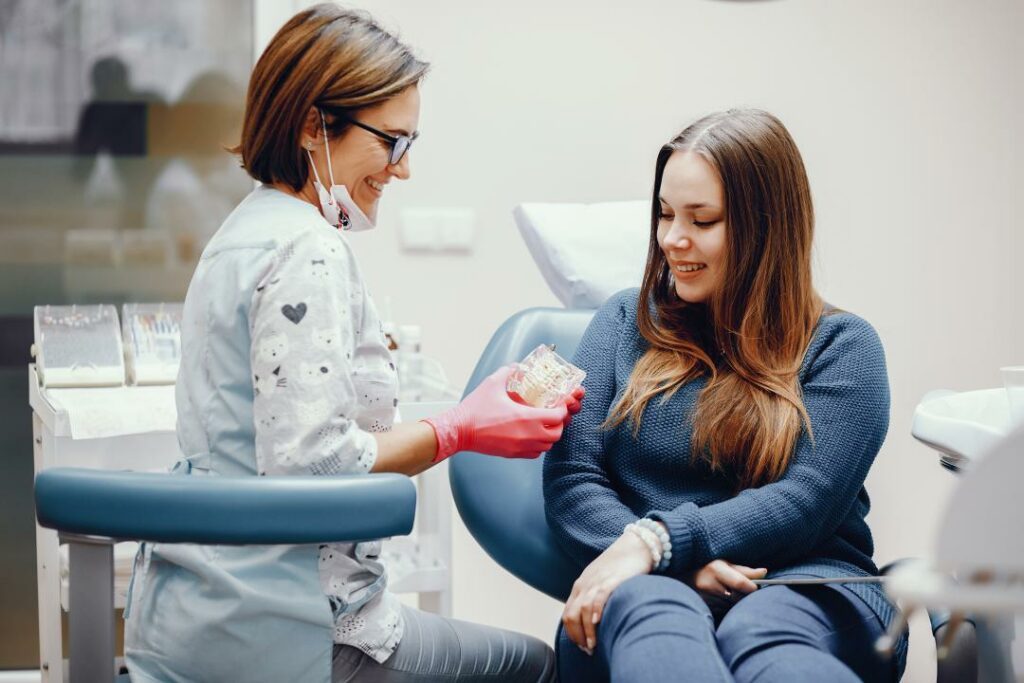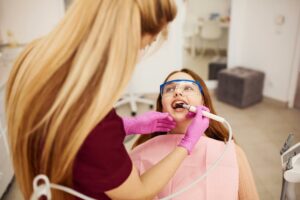Table of Contents

Discover the intricate connection between women’s hormones and dental health. Explore the effects of hormonal changes on oral health and learn how Synergy Health Travel in Izmir, Turkey, can provide exceptional healthcare solutions and an unforgettable health tourism experience.
Introduction to the Women’s Hormones and Dental Health
Dental health plays a crucial role in our overall well-being, and maintaining a healthy smile is essential for a vibrant and confident life. However, many people are unaware of the fascinating connection between women’s hormones and dental health. In this article, we will delve into this intricate relationship, exploring how hormonal changes can impact oral health in women.
The female body undergoes significant hormonal fluctuations throughout various stages of life, such as puberty, menstruation, pregnancy, and menopause. These hormonal shifts can affect the oral cavity in several ways, from the health of gums and saliva to the susceptibility of dental issues. Understanding these connections empowers women to make informed decisions about their dental care.
As we explore the fascinating world of women’s hormones and dental health, we will also introduce you to Synergy Health Travel, an international health travel agency based in Izmir, Turkey. Synergy Health Travel specializes in providing exceptional healthcare solutions and personalized health tourism experiences. With their expertise, they can help you embark on a journey of dental wellness while enjoying the rich cultural heritage and modern amenities of Izmir.
Join us on this enlightening exploration of hormonal harmony and dental health, and discover how Synergy Health Travel can be your trusted partner in achieving optimal oral well-being.
The Basics of Women’s Hormones
To understand the impact of hormones on dental health, it is essential to grasp the basics of the female endocrine system. The endocrine system consists of glands that produce hormones, which are chemical messengers that regulate various bodily functions.
Overview of the Female Endocrine System
The female endocrine system includes several key glands, such as the hypothalamus, pituitary gland, ovaries, and adrenal glands. These glands work in harmony to produce and regulate hormones that are vital for reproductive and overall health.
Key Hormones and Their Roles
Several hormones play critical roles in the female body, influencing not only reproductive functions but also affecting other systems, including oral health. Here are some key hormones and their roles:
- Estrogen: Estrogen is a primary female sex hormone responsible for the development and regulation of the female reproductive system. It also plays a role in bone health and oral health, influencing the condition of gums and saliva.
- Progesterone: Progesterone is another essential female sex hormone involved in the menstrual cycle and pregnancy. It helps prepare the uterus for pregnancy and supports the development of the mammary glands. Progesterone can impact oral health, particularly during specific hormonal fluctuations.
- Follicle-Stimulating Hormone (FSH): FSH is produced by the pituitary gland and plays a crucial role in stimulating the growth of ovarian follicles and the production of eggs. FSH levels fluctuate during the menstrual cycle, affecting hormone balance.
- Luteinizing Hormone (LH): LH works in conjunction with FSH to regulate the menstrual cycle and trigger ovulation. LH levels rise just before ovulation, influencing hormone levels.
Menstrual Cycle and Hormonal Fluctuations
The menstrual cycle is a natural process that occurs in women of reproductive age. It involves the cyclical release of hormones and the shedding of the uterine lining. Throughout the menstrual cycle, hormonal fluctuations occur, which can have an impact on various aspects of a woman’s health, including oral health.
Understanding the menstrual cycle and how hormones fluctuate during different phases provides valuable insights into the potential effects on dental health. By recognizing the connections between hormones and oral well-being, women can take proactive steps to maintain a healthy smile at every stage of their cycle.
In the following sections, we will delve deeper into the effects of these hormonal changes on oral health and explore the specific implications during pregnancy and menopause.

Understanding the Relationship Between Hormones and Dental Health
Hormonal changes, particularly those related to estrogen and progesterone, can have significant effects on dental health. Understanding these effects is crucial for women to maintain optimal oral well-being throughout their lives.
Effects of Estrogen on Gums and Saliva
Estrogen plays a vital role in maintaining the health of gums and saliva. During certain phases of the menstrual cycle, estrogen levels increase, leading to changes in oral tissues. Here are some effects of estrogen on gums and saliva:
- Gingival Changes: Estrogen can cause increased blood flow to the gums, making them more sensitive and prone to inflammation. This can result in symptoms such as gum tenderness, swelling, and a higher likelihood of bleeding during brushing or flossing.
- Pregnancy Gingivitis: Pregnant women may experience a condition called pregnancy gingivitis, which is characterized by red, swollen, and tender gums. Hormonal changes during pregnancy can exaggerate the body’s response to dental plaque, leading to increased gum inflammation and a higher risk of gum disease.
- Saliva Composition: Estrogen can influence saliva production and composition. Changes in saliva flow and composition can affect the oral environment, potentially leading to an increased risk of tooth decay and other oral health issues.
Impact of Progesterone on Dental Health
Progesterone, another key female hormone, can also impact dental health, especially when its levels fluctuate. Here’s how progesterone can affect oral health:
- Increased Gum Sensitivity: Progesterone can cause increased blood flow and vascular permeability in the gum tissues. This can lead to heightened gum sensitivity and an increased risk of gum inflammation and bleeding.
- Altered Response to Dental Plaque: Progesterone can affect the body’s response to dental plaque, making gums more reactive and susceptible to gingival inflammation. This can contribute to the development of gum disease if proper oral hygiene practices are not maintained.
Hormonal Imbalances and Oral Health Problems
Hormonal imbalances, such as those that occur during certain medical conditions or as a result of medication, can have adverse effects on oral health. Here are some oral health problems that can arise due to hormonal imbalances:
- Dry Mouth: Hormonal imbalances can lead to reduced saliva production, resulting in dry mouth. Dry mouth can increase the risk of tooth decay, gum disease, and oral infections.
- Bone Loss: Estrogen deficiency, which can occur during menopause or certain medical conditions, can contribute to bone loss, including the jawbone. This bone loss can weaken the foundation that supports teeth, leading to tooth loss and other oral health complications.
- Changes in Taste and Smell: Hormonal imbalances may affect a woman’s sense of taste and smell, potentially altering her perception of flavors and odors.
Understanding the effects of hormonal changes and recognizing the signs of hormonal imbalances can help women take proactive steps in maintaining their dental health. Regular dental check-ups, proper oral hygiene practices, and timely intervention can mitigate the potential oral health issues associated with hormonal fluctuations.
Pregnancy and Dental Health
Pregnancy is a special time in a woman’s life, and it is essential to prioritize dental health during this period. Hormonal shifts and changes in the body can have specific implications for oral health. Understanding the oral health considerations during pregnancy and following dental care guidelines can help expectant mothers maintain a healthy smile.
Oral Health Considerations During Pregnancy
Pregnancy brings about various changes in the body, including hormonal fluctuations and an altered immune response. These factors can impact oral health in the following ways:
- Pregnancy Gingivitis: Hormonal changes, particularly increased levels of progesterone, can exaggerate the body’s response to dental plaque, leading to pregnancy gingivitis. This condition is characterized by red, swollen, and tender gums, which are more prone to bleeding. Pregnancy gingivitis typically occurs between the second and eighth month of pregnancy.
- Increased Risk of Tooth Decay: Pregnancy cravings and dietary changes can increase the risk of tooth decay. Consuming sugary snacks and beverages more frequently can contribute to the development of cavities. Additionally, morning sickness, with its associated vomiting and acid reflux, can expose teeth to stomach acids, further increasing the risk of tooth erosion and decay.
- Pregnancy Tumors: In rare cases, some pregnant women may develop pregnancy tumors or pyogenic granulomas. These are non-cancerous growths that usually appear on the gums and are associated with excessive inflammation. While these growths are generally harmless and resolve after pregnancy, they may require professional dental treatment if they cause discomfort or interfere with oral hygiene.
Hormonal Shifts and Pregnancy Gingivitis
The hormonal shifts during pregnancy can contribute to the development of pregnancy gingivitis. Progesterone, in particular, can enhance the body’s inflammatory response to plaque, leading to gum inflammation and sensitivity. It is important to recognize the signs of pregnancy gingivitis, which may include:
- Swollen, red, or tender gums
- Gums that bleed easily, especially during brushing or flossing
- Receding gumline or the appearance of small pimple-like structures on the gums
Regular dental check-ups during pregnancy can help monitor and manage pregnancy gingivitis effectively.
Dental Care Guidelines for Expectant Mothers
Maintaining good oral hygiene and seeking appropriate dental care during pregnancy is vital for the well-being of both the mother and the baby. Here are some guidelines to follow:
- Regular Dental Check-ups: Schedule routine dental check-ups, including professional cleanings, during pregnancy. Inform your dentist about your pregnancy and any changes in your health.
- Oral Hygiene Practices: Brush your teeth at least twice a day with a fluoridated toothpaste and a soft-bristled toothbrush. Floss daily to remove plaque and debris from between your teeth.
- Dietary Choices: Choose a balanced and nutritious diet that promotes both your overall health and dental health. Limit your consumption of sugary snacks and beverages, opting for healthier alternatives instead.
- Morning Sickness Management: If you experience morning sickness, rinse your mouth with water or a fluoride mouthwash after vomiting to neutralize acid. Avoid brushing your teeth immediately after vomiting, as the stomach acids can temporarily weaken tooth enamel.
- Medication and Dental Procedures: Inform your dentist about any medications, including prenatal vitamins, that you are taking. Consult with your healthcare provider and dentist regarding the safety of dental procedures during pregnancy.
By following these dental care guidelines, expectant mothers can help prevent oral health issues and promote a healthy oral environment for both themselves and their developing babies. Remember, a healthy smile contributes to a healthy pregnancy!
Menopause and Dental Health
Menopause is a natural phase in a woman’s life that marks the end of reproductive years. Along with the various hormonal changes that occur during menopause, there are specific oral health challenges that women may face. Understanding these challenges and the importance of dental care during menopause is crucial for maintaining oral well-being.
Oral Health Challenges During Menopause
During menopause, women may experience the following oral health challenges:
- Dry Mouth: Decreased estrogen levels can lead to a reduction in saliva production, resulting in dry mouth. Dry mouth can increase the risk of tooth decay, gum disease, and oral infections. It can also cause discomfort and difficulty in speaking and swallowing.
- Gum Disease: Hormonal changes during menopause can make gums more sensitive and prone to inflammation. This increased susceptibility to gum disease can result in symptoms such as redness, swelling, tenderness, and bleeding gums.
- Bone Loss: Estrogen deficiency, a hallmark of menopause, can contribute to bone loss, including the jawbone. This bone loss can weaken the foundation that supports teeth, leading to tooth loss and other oral health complications.
- Burning Mouth Syndrome: Some women may experience a condition called burning mouth syndrome during menopause. It is characterized by a burning or tingling sensation in the mouth, often accompanied by altered taste sensations.
Estrogen Deficiency and Bone Loss
Estrogen plays a crucial role in maintaining bone density. During menopause, when estrogen levels decline, women become more susceptible to bone loss, including the jawbone. This can have implications for dental health, as it may weaken the supporting structures of teeth, leading to tooth mobility and increased risk of tooth loss.
Bone loss in the jaw can also affect the fit of dentures or other dental prosthetics. It is essential for menopausal women to communicate with their dentist and prosthodontist to ensure proper fitting and adjustments if needed.
Importance of Regular Dental Exams and Treatments
Regular dental exams and treatments are particularly important during menopause to address the specific oral health challenges and mitigate potential complications. Here’s why regular dental care is crucial:
- Early Detection of Oral Health Issues: Regular dental exams allow for the early detection of dental problems, such as gum disease, tooth decay, and bone loss. Timely intervention can prevent further progression of these issues and preserve oral health.
- Professional Cleanings: Professional cleanings help remove plaque, tartar, and stains that may have accumulated on the teeth. This is especially important for menopausal women, as they may be more prone to gum disease and tooth decay.
- Customized Treatment Plans: Your dentist can develop personalized treatment plans based on your specific oral health needs during menopause. This may include strategies to manage dry mouth, preventive measures against gum disease, and considerations for bone health.
- Oral Health Education: Regular dental visits provide an opportunity for oral health education. Your dentist can offer guidance on proper oral hygiene practices, nutrition, and lifestyle factors that can support your oral well-being during menopause.
By prioritizing regular dental exams and treatments, menopausal women can maintain good oral health, minimize complications, and preserve their radiant smiles as they embrace this new phase of life.
Women’s Hormones and Dental Procedures

The hormonal changes that women experience throughout their menstrual cycles, pregnancy, and menopause can have an impact on dental procedures. Understanding these hormonal influences and identifying the ideal times for dental treatments can help optimize outcomes and ensure proper management of oral health.
Impact of Hormonal Changes on Dental Procedures
Hormonal fluctuations can affect the body’s response to dental procedures. Here are some ways hormones can influence dental treatments:
- Bleeding and Healing: Estrogen and progesterone levels can affect blood clotting and the healing process. During certain phases of the menstrual cycle or pregnancy, women may experience increased bleeding during dental procedures. Dentists may need to take extra precautions to ensure proper hemostasis and optimal healing.
- Gum Sensitivity: Hormonal changes can make the gums more sensitive, especially during pregnancy or certain stages of the menstrual cycle. Dentists should consider this increased sensitivity when performing procedures that involve the gums, such as scaling and root planing or periodontal surgery.
- Xerostomia (Dry Mouth): Hormonal shifts or medications used during certain stages, such as menopause, can contribute to dry mouth. Dentists should be aware of this condition, as it may necessitate modifications in treatment plans or the use of alternative materials to prevent potential complications, such as increased risk of tooth decay.
Ideal Times for Dental Treatments in Women’s Hormonal Cycles
Timing dental treatments with consideration for hormonal fluctuations can enhance outcomes and patient comfort. While individual variations exist, here are some general guidelines for scheduling dental procedures:
- Menstrual Cycle: If possible, it may be beneficial to schedule non-emergency dental treatments during the follicular phase of the menstrual cycle (days 1-14). During this phase, hormone levels are relatively stable, and women may experience less gum sensitivity and reduced bleeding.
- Pregnancy: Elective dental treatments are often recommended to be scheduled during the second trimester of pregnancy. This is considered the safest period for dental procedures, as the risk of potential complications is minimized. However, essential or emergency dental treatments can be performed at any stage of pregnancy.
- Menopause: Menopause is a transition period and does not have a specific phase like the menstrual cycle. However, it is advisable to consult with both your dentist and healthcare provider to assess the timing of dental procedures based on individual health considerations and hormone replacement therapy, if applicable.
Managing Oral Health Before, During, and After Dental Procedures
Proper oral health management is crucial before, during, and after dental procedures, regardless of hormonal influences. Here are some general guidelines:
- Pre-Treatment: Maintain good oral hygiene practices, including brushing twice a day, flossing daily, and rinsing with an antimicrobial mouthwash. Inform your dentist about any changes in your health, medications, or hormone therapy.
- During Treatment: Follow the instructions provided by your dentist, especially regarding post-operative care and medication. If you experience any unusual symptoms or complications, contact your dentist promptly.
- Post-Treatment: Continue practicing good oral hygiene and follow any additional instructions given by your dentist. Attend regular dental check-ups to monitor your oral health and address any concerns that may arise.
By considering the hormonal influences on dental procedures and effectively managing oral health before, during, and after treatments, women can ensure optimal outcomes and maintain their oral well-being at every stage of their hormonal cycles. Open communication with your dentist and healthcare provider is key to developing a comprehensive treatment plan tailored to your specific needs.
Frequently Asked Questions about Women’s Hormones and Dental Health
- How do women’s hormones affect dental health?
Women’s hormones, such as estrogen and progesterone, can impact dental health in various ways. Hormonal changes can affect gum health, saliva production, and the body’s response to dental procedures, potentially leading to gum disease, dry mouth, and other oral health issues.
- Can hormonal changes during pregnancy affect oral health?
Yes, hormonal changes during pregnancy can affect oral health. Pregnancy gingivitis, increased risk of tooth decay, and pregnancy tumors are some common oral health issues that can arise during pregnancy. It is important for expectant mothers to maintain good oral hygiene and seek regular dental care during this time.
- Can menopause affect dental health?
Yes, menopause can have an impact on dental health. Decreased estrogen levels during menopause can lead to dry mouth, gum sensitivity, and bone loss, which can increase the risk of tooth decay, gum disease, and tooth loss. Regular dental check-ups and proper oral hygiene practices are crucial during this stage.
- Are there ideal times for dental treatments based on women’s hormonal cycles?
While individual variations exist, scheduling non-emergency dental treatments during the follicular phase of the menstrual cycle (days 1-14) or during the second trimester of pregnancy is often recommended. However, it is best to consult with your dentist to determine the most suitable timing based on your specific circumstances.
- How can I manage oral health before, during, and after dental procedures influenced by hormones?
To manage oral health before, during, and after dental procedures, it is important to maintain good oral hygiene practices, follow your dentist’s instructions, and attend regular dental check-ups. Inform your dentist about any hormonal changes, medications, or health conditions you may have.
Conclusion
In conclusion, the connection between women’s hormones and dental health is an important aspect that should not be overlooked. Hormonal changes throughout a woman’s life, including during menstruation, pregnancy, and menopause, can have significant effects on oral health. Understanding these effects and taking proactive measures to maintain oral hygiene and seek regular dental care is crucial for overall well-being.
Synergy Health Travel, located in Izmir, Turkey, is your trusted partner in health tourism. With a commitment to providing exceptional service and personalized care, Synergy Health Travel aims to make your health tourism experience in Turkey seamless and successful. By collaborating with reputable healthcare providers, offering affordable treatment options, and providing comprehensive support throughout your journey, Synergy Health Travel ensures your comfort and satisfaction.
We encourage women to prioritize their dental health. By being aware of the impact of hormonal changes on oral health and taking proactive steps, such as regular dental check-ups, practicing good oral hygiene, and seeking timely treatment, women can maintain healthy and vibrant smiles at every stage of their lives.
Remember, your oral health is an integral part of your overall well-being. Take control of your dental health and trust Synergy Health Travel to assist you in your health tourism journey. Let us be your partner in achieving optimal oral health and a confident smile.
Contact Synergy Health Travel today to embark on a transformative dental experience in Turkey. Empower yourself and prioritize your dental health with the support of our dedicated team. Your smile deserves the best care, and Synergy Health Travel is here to make it happen.
Feel free to contact us 🙂
Follow us on Instagram: Synergy Global




